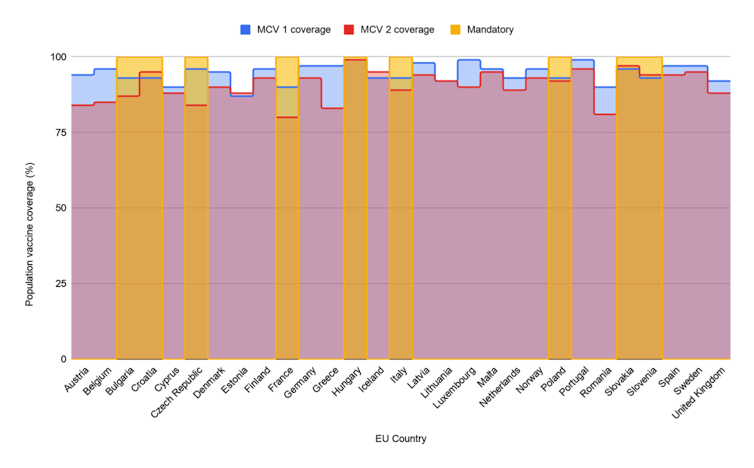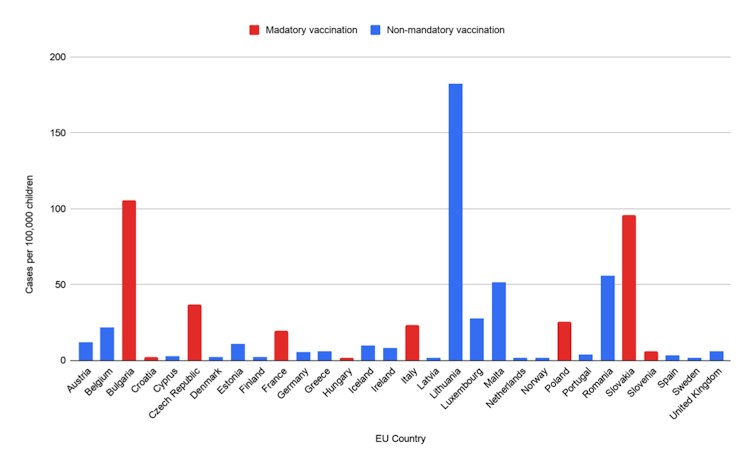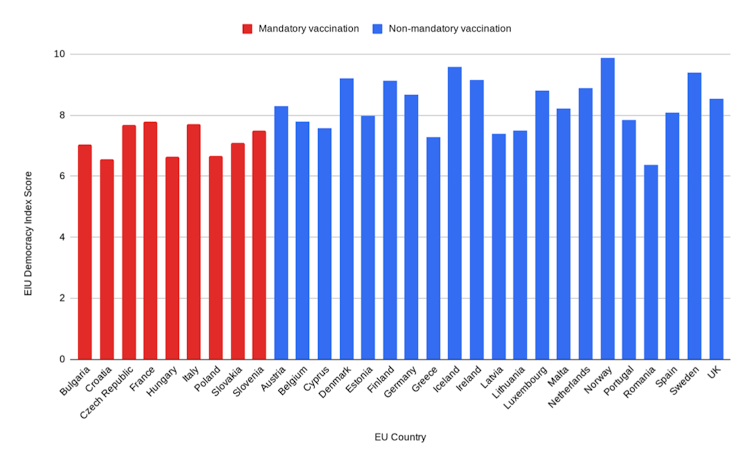Global measles cases reached their highest levels since 2006 in the first six months of 2019. With countries around the world struggling to contain outbreaks, government policy on vaccination has come under fire. Germany has been the latest to succumb to the pressure.
Given the free movement of citizens between EU countries, consistent public health policy is particularly important there. For instance, there were over 230 cases of measles in the UK in the first quarter of 2019, most of which were linked to travel in Europe.
Although measles cases are at a record high, more children in the World Health Organization (WHO) European Region are being vaccinated than ever before. Improvements in vaccination rates are being overshadowed by small clusters of susceptible people who continue to act as a reservoir for the disease. No EU country can hope to control measles adequately without success across the entire region. So the question is: is mandatory vaccination the key to success?
Nine out of 30 European countries have mandatory vaccination for measles, which involves two doses, one in the first two years of life (MCV 1) and one later in childhood (MCV 2). There is no clear difference in vaccine coverage between countries with mandatory vaccination compared with those without mandatory vaccination.

Measles vaccine coverage by EU/EEA country (2018) ECDC, WHO
Looking at the number of measles cases in children by country, there is also no consistent difference, with some countries that have mandatory vaccination, such as Bulgaria and Slovakia, having very high rates of measles.

Number of measles cases per 100,000 children in EU/EEA countries. ECDC, World Bank
Mandatory vaccination is undemocratic
The most obvious problem with mandatory vaccination is that it impinges on people’s rights, a fundamental aspect of liberal democracy. Indeed, the social perception of the rich imposing their will at the expense of individual autonomy led to the end of mandatory smallpox vaccination in England in 1946.
However, some might argue that it is the government’s job to take tough measures in the interest of public health. So the differences in EU countries’ approaches reflect different political systems and their willingness to override individual autonomy for a perceived greater common benefit.
An Economist Intelligence Unit democracy index, based on 60 indicators including civil liberties and human rights, shows that EU countries where measles vaccination is mandatory are all classed as “flawed democracies”. In countries where vaccination is not mandatory, 62% were classed as “full democracies”.

EU country by EIU Democracy Index Score. Economist Intelligence Unit (EIU)
Taking all the evidence together, it is clear that weak democratic systems in some EU countries enable the implementation of mandatory vaccination, for little or no benefit to public health.
Alternatives
We know a lot about the reasons behind vaccine hesitancy. Parents declining the measles, mumps and rubella (MMR) vaccine often believe that vaccines are unsafe and ineffective and that the diseases they prevent are mild and uncommon. Some lack trust in their health professionals and in science. Solutions to this exist, with several randomised controlled trials (the gold standard of medical research) finding that parents’ attitudes can be changed with the right training programmes.
It’s also important to have enough clinics that provide vaccinations. Public health seems to have been an easy target for budget cuts in many European countries. In many countries, most vaccine sceptics are not vehement “anti-vaxxers”, but have a cautious stance on vaccination. For people like this, having accessible and convenient vaccination services as well as supportive professional guidance are fundamental to effective policy.
A 2019 study from France found that a year after making vaccination mandatory, vaccination coverage for measles increased. This is misleading. It is likely to reflect the success of actions derived from significant political commitment, including funding public health services, public awareness campaigns and outreach activities, rather than the law itself.
To deal with measles, EU policy must be consistent, fair and effective. Well-understood and documented reasons underlying low rates of vaccination exist. It’s important that these are addressed to engage hard-to-reach groups, before leaping to radical measures with a weak evidence base, under the guise of action.



 Federal Judge Restores Funding for Gateway Rail Tunnel Project
Federal Judge Restores Funding for Gateway Rail Tunnel Project  Trump Lawsuit Against JPMorgan Signals Rising Tensions Between Wall Street and the White House
Trump Lawsuit Against JPMorgan Signals Rising Tensions Between Wall Street and the White House  Federal Judge Blocks Trump Administration Move to End TPS for Haitian Immigrants
Federal Judge Blocks Trump Administration Move to End TPS for Haitian Immigrants  Panama Supreme Court Voids CK Hutchison Port Concessions, Raising Geopolitical and Trade Concerns
Panama Supreme Court Voids CK Hutchison Port Concessions, Raising Geopolitical and Trade Concerns  Trump Family Files $10 Billion Lawsuit Over IRS Tax Disclosure
Trump Family Files $10 Billion Lawsuit Over IRS Tax Disclosure  Newly Released DOJ Epstein Files Expose High-Profile Connections Across Politics and Business
Newly Released DOJ Epstein Files Expose High-Profile Connections Across Politics and Business  Panama Supreme Court Voids Hong Kong Firm’s Panama Canal Port Contracts Over Constitutional Violations
Panama Supreme Court Voids Hong Kong Firm’s Panama Canal Port Contracts Over Constitutional Violations  Supreme Court Tests Federal Reserve Independence Amid Trump’s Bid to Fire Lisa Cook
Supreme Court Tests Federal Reserve Independence Amid Trump’s Bid to Fire Lisa Cook  US Judge Rejects $2.36B Penalty Bid Against Google in Privacy Data Case
US Judge Rejects $2.36B Penalty Bid Against Google in Privacy Data Case  Meta Faces Lawsuit Over Alleged Approval of AI Chatbots Allowing Sexual Interactions With Minors
Meta Faces Lawsuit Over Alleged Approval of AI Chatbots Allowing Sexual Interactions With Minors  Federal Judge Signals Possible Dismissal of xAI Lawsuit Against OpenAI
Federal Judge Signals Possible Dismissal of xAI Lawsuit Against OpenAI 































